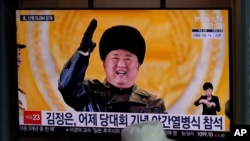As President Joe Biden was sworn into office Wednesday, North Korean defectors living throughout the United States expressed hope that his administration would place North Koreans’ human rights above Pyongyang’s nuclear weapons and deal forcefully with leader Kim Jong Un.
“If [the Biden administration] focuses more attention on North Korean human rights, it can lead to a result that grants legitimacy to the people, the residents of North Korea,” said Jake Kim, a 38-year-old North Korean defector who arrived in the U.S. in 2015 and is studying political science at Utah Valley University, a public institution in the city of Orem.
“But when you ignore human rights and focus on nuclear weapons and Kim Jong Un, it can end up legitimizing Kim Jong Un’s regime,” he told VOA Korean Service.
Kim added, “I think the issue of North Korea’s nuclear weapons will be resolved when human rights issue is resolved first.”
Former President Donald Trump initially focused attention on North Korea’s human rights record by inviting defector and human rights activist Ji Seong-ho to his first State of the Union in 2018. Trump highlighted Ji’s flight on crutches from North Korea.
Now a member of South Korean National Assembly, Ji is a double amputee.
But as Trump forged a close relationship with North Korea’s leader through two U.S.-North Korean summits, a meeting and exchanges of personal letters, human rights issues receded to the background.
Trump’s initial efforts to hold Kim accountable for North Korea’s human rights violations gave way to frequent praise for him. Trump said he had a “great relationship” with Kim and that the two “fell in love” even as nuclear talks with North Korea broke down.
Referring to Trump’s conciliatory tones toward Kim, Justin Seo, a 32-year-old Virginia resident who came to the U.S. in 2009, said, “What I was disappointed with President Trump, to be honest, is that he called Kim Jong Un ‘great.’”
Seo continued, “I would like [Biden] to deal more forcefully [with the regime].”
Charles Kim, 53, who lives in Charlottesville, Virginia, wants to see continued U.S. pressure on Pyongyang.
“I would like the Biden administration to seek measures to pressure North Korea so that sanctions on North Korea can become more effective,” said Kim, who fled North Korea in 2005 and arrived in the U.S. in 2008. In July, more than 40 countries accused North Korea of breaching a United Nations cap on refined petroleum imports. The nations said Pyongyang was able to “flagrantly evade international sanctions.” A 2019 report found North Korea used increasingly innovative techniques to evade sanctions in its effort to raise money for its nuclear weapons program.
There are currently more than 200 North Korean defectors living across the U.S. They came to the U.S. through a number of other countries, most in Southeast Asia such as Cambodia and Thailand. And while most of them are living in the U.S. as legal residents, some are staying as illegal immigrants.
North Korea, considered one of the most repressive countries in the world, does not grant its citizens basic rights such as freedom of speech and assembly and violates the human rights of its citizens.
According to a 2014 U.N. Commission of Inquiry (COI) report on North Korea’s human rights, the regime committed crimes against humanity including extermination, enslavement, torture and rape.
North Koreans who flee risk their lives because the regime considers defection a crime of “treachery against the nation.” If they are caught escaping the country, they can face imprisonment in one of North Korea’s short-term detention facilities, long-term ordinary prisons or political prison camps.
Describing herself as “a survivor who experienced true North Korea,” Grace Jo, a 29-year-old student at the Savannah College of Art and Design in Georgia, spoke on behalf of North Korean defectors seeking freedom in the U.S.
“I would be very thankful if the new administration listens to the voice of those people and help giving them freedom so there can be more free college students like myself,” said Jo, who escaped North Korea in October 2006 and entered the U.S. two years later in March 2008.
Christy Lee contributed to this report, originated by VOA Korean.




